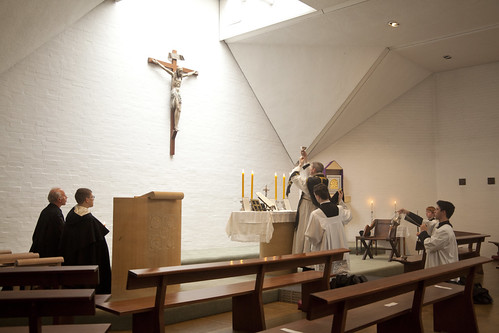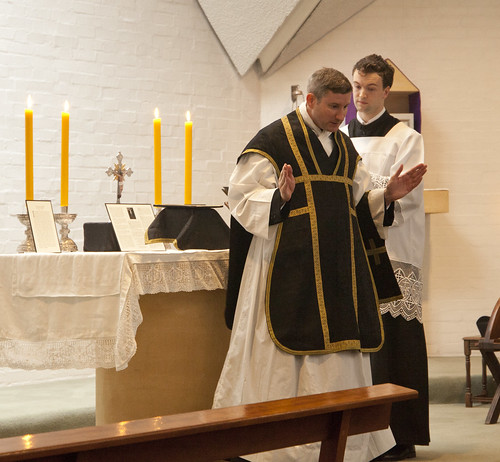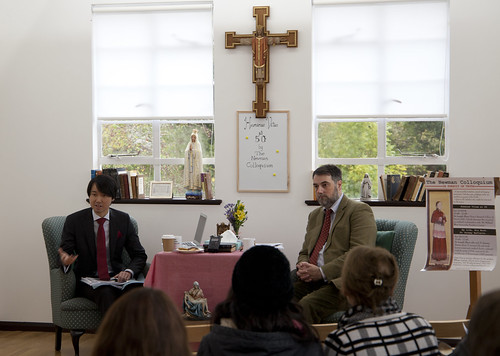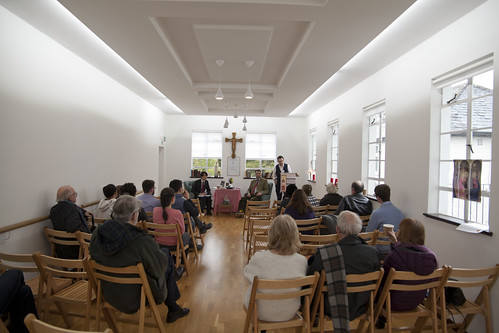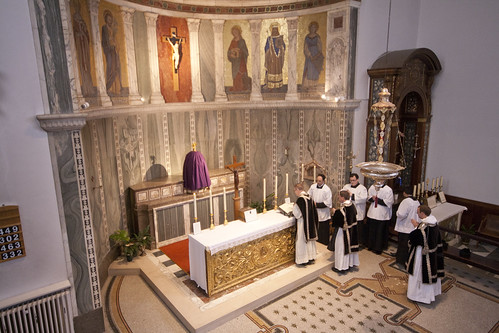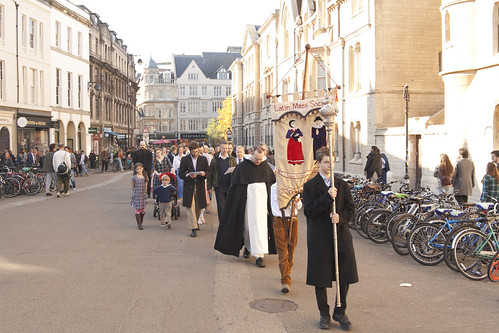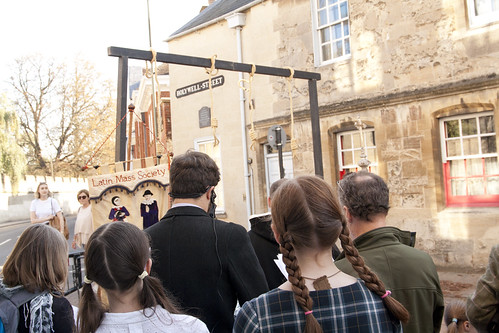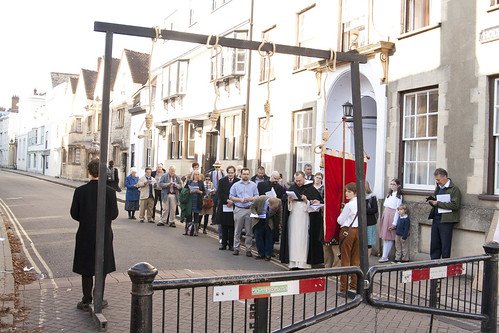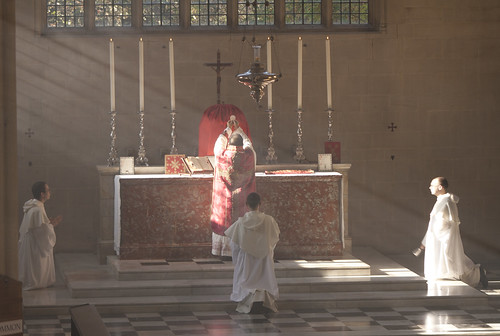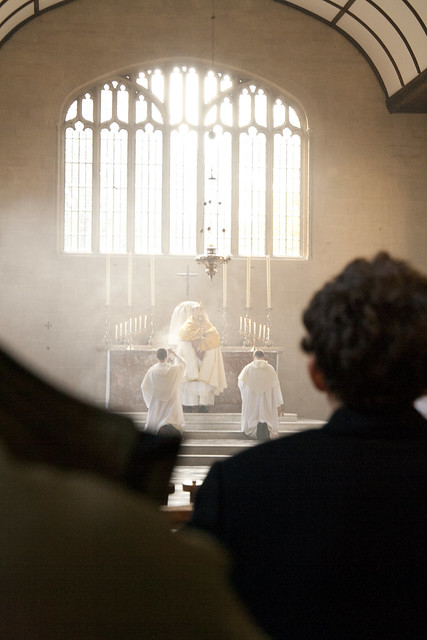Chairman's Blog
Requiem in Oxford University Catholic Chaplaincy
With the kind permission of Fr Matthew Power SJ, a traditional Requiem Mass was celebrated on Saturday 3rd November in the St Thomas More Chapel of the Oxford University Catholic Chaplaincy. The celebrant was Fr Daniel Seward of the Oxford Oratory.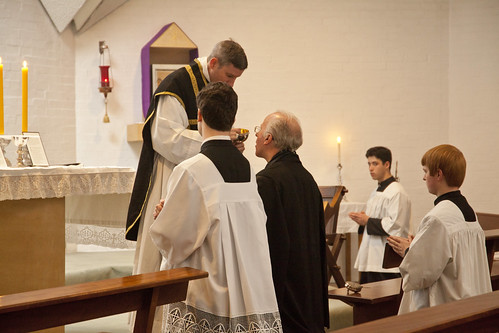
The previous Traditional Mass, and only other, public Mass in the Extraordinary Form celebrated in the Chaplaincy was also a Requiem, celebrated on All Souls Day 2013, also by Fr Seward. On both occasions it was the result of requests mediated by the Latin Mass Society.
Support the work of the LMS by becoming an 'Anniversary Supporter'.
How Agatha Christie saved the Latin Mass
This weekend I have an article in the Catholic Herald's print edition. It begins:
On November 26, 1971, the front page of the Universe informed its readers as follows:
As from this Sunday, the first in Advent, it is forbidden to offer Mass in the Tridentine rite anywhere in the world. In very special circumstances old or retired priests may apply to their own bishop for permission to use the rite, but for private use only.
Only a few days later, however, on December 2, the Times carried a rather different story, under the headline “Pope sanctions traditional Latin Mass in Britain”. The Tridentine Mass was, in fact, celebrated in Westminster Cathedral on June 17 the following year, the first of a series of two annual Masses at the High Altar using the older Missal. Monthly traditional Masses in the Cathedral’s crypt were also initiated. Both series of Masses continue to this day, although the crypt Masses have now moved to the Lady Chapel.
In the nick of time, it would seem, the public celebration of the Vetus Ordo, now also called the Extraordinary Form, was preserved, at least in England and Wales. How had this come about?
Support the work of the LMS by becoming an 'Anniversary Supporter'.
Marriage lite comes to England
I have a new post on LifeSiteNews. It begins:
Following a ruling of Britain’s Supreme Court over the summer, Prime Minister Theresa May has announced that the Government will make the necessary changes to allow heterosexual, and not just homosexual, couples to contract ‘Civil Partnerships’, as opposed to marriages, in England and Wales. (Scotland will probably follow.)
Bishop Peter Doyle of Northampton, on behalf of the Bishops’ Conference of England and Wales, urged couples not to use this option:
God blesses the marriage bond only when the couple freely and without conditions exchange their consent. We hope that today’s ruling does not deter people from that sacred and life-long commitment.
Back in 2004, when Civil Partnerships were introduced for same-sex couples in the UK, the Bishops of England and Wales did not oppose the legislation, on the basis of government assurances that they would be clearly distinct from marriage. The idea seemed to be that Civil Partnerships addressed the legitimate grievances of same-sex couples, notably over hospital visiting rights and exemption from Inheritance Tax when leaving each other money, and that it would obviate the need for same-sex ‘marriage’.
Things did not turn out that way. Having established the principle that the state has an interest in regulating same-sex relationships in a way clearly paralleling the regulation of marriage, the scene was set for same-sex ‘marriage’ itself in 2014.
Newman Colloquium series continues
There was a good turn out for the first Newman Colloquium on Saturday 27 Oct 2018. Michael Wee of the Anscombe Centre and I discussed 'Humanae Vitae at 50'.
Hot drinks and plenty of biscuits were very welcome afterwards as it was rather drizzly and cold in Oxford.
The next Newman Colloquium takes place on Saturday 24th November, when I talk to Fr Jeremy Davies, a experienced missionary, doctor, and exorcist.
Visit Newmancolloquium.eventbrite.com to sign up.
Support the work of the LMS by becoming an 'Anniversary Supporter'.
London Vespers and Book-launch for Peter Kwasniewsky, 30th October
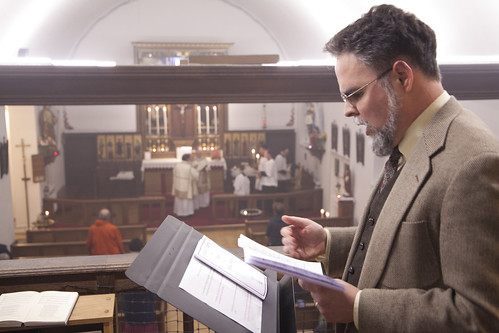 |
| Peter Kwasniewski directing the chant at Mass in Oxford |
Tuesday, October 30th – Church of Our Lady of the Assumption and St Gregory, Warwick Street, London: Vespers with Palestrina at 6pm, followed by talk and book-signing by Peter Kwasniewski.
More on Peter's latest book here.
6:30 pm – Lecture by Dr Kwasniewski: “Liturgical Reform, Ars Celebrandi, and the Crisis on Marriage and Family”
7:30 pm – Signing of Tradition and Sanity: Conversations & Dialogues of a Postconciliar Exile (Angelico, 2018)
Support the work of the LMS by becoming an 'Anniversary Supporter'.
LMS Pilgrimage to Aylesford, Saturday 27th October
Our annual pilgrimage to The Friars, the home of the Carmelites.

There will be a Sung Mass at 1.30pm in the Relic Chapel and the day concludes with Vespers and Benediction at 4pm.
Included in the music for the Mass (supplied by Cantus Magnus, dir. Matthew Shellhorn) will be the UK premier and world prenier of pieces by Peter Kwasniewski:
Missa a cuatro voces (K, G, S, A) de Rivera
Benedicta et venerabilis Kwasniewski UK PREMIERE
Ego mater Kwasniewski WORLD PREMIERE
Mass is at 1:30pm, at
Support the work of the LMS by becoming an 'Anniversary Supporter'.
Peter Kwasniewski's book launch in Oxford: Friday, after 6pm High Mass in SS Gregory & Augustine
All the details are below. We'll have copies of Peter's most recent three books.
On Saturday he will be at the LMS Pilgrimage to Aylesford. See here for more details.
More on Peter's latest book here.

Support the work of the LMS by becoming an 'Anniversary Supporter'.
The Pope and the Papacy
My latest on LifeSiteNews begins thus:
Read it all there.
Support the work of the LMS by becoming an 'Anniversary Supporter'.
On relics and their uses
My latest on LifeSiteNews starts thus:
Read it all there.
Support the work of the LMS by becoming an 'Anniversary Supporter'.
Making Oxford's Streets sacred again
The Latin Mass Society held its annual Pilgrimage to Oxford last Saturday.
In the 19th century a surprisingly broad cross-section of Anglicans incorporated into their thinking the notion of sacred space, leading to a new conception of what churches should be like: a conception which harked back to many old churches' Catholic past. This conception of sacred space had a natural parallel in the idea of processions. This was also the historical moment when Catholic church-building and processions began to be largely untrammelled by legal restrictions, so Catholics, less surprisingly, were doing the same things at the same time. For about a century England saw an amazing number of these, and then they suddenly almost died out in the 1970s.
The idea of sacred space implies that one place can be a better one than another for prayer not just because it is convenient and quiet but because it is holy. When our churches are consecrated there are lots of prayers and ceremonies which call down God's blessing on the building with this idea in mind. But consecration by a bishop is not the only factor: it will also particularly please God to answer our prayers if the place where we are praying is associated with the lives and sufferings of his saints. It is natural therefore to build churches at the sites of martyrdoms (the origin of St Peters and of many ancient Roman churches) and to bring relics of the saints into them. We can also go out to such sites, such as do not, yet, have churches built over them.
The site of the Catholic martyrdoms of 1589 was the Town Gallows, now occupied (approximately) by 100 Holywell Street. Four brave men, two priests and two laymen, made the ultimate witness to the Catholic Faith there, and we can witness to the Faith we share with them by going there in procession. When there the cleric with us says the Collect from the Mass of the Martyrs of England and Wales, and we sing the Church's hymn of thanksgiving, the Te Deum.
This year the sun shone and numbers were higher than they have been for quite a few years, with 70 in church and a very creditable 35 people processing through Oxford's tourists and shoppers.
Many thanks to the Prior and Community of Blackfriars for hosting us, and to Fr Lawrence Lew OP for celebrating the Mass, and to Mrs Shaw for providing lunch for pilgrims in Blackfriars' Aula.
Read more about the martyrs and this event here.
Support the work of the LMS by becoming an 'Anniversary Supporter'.

